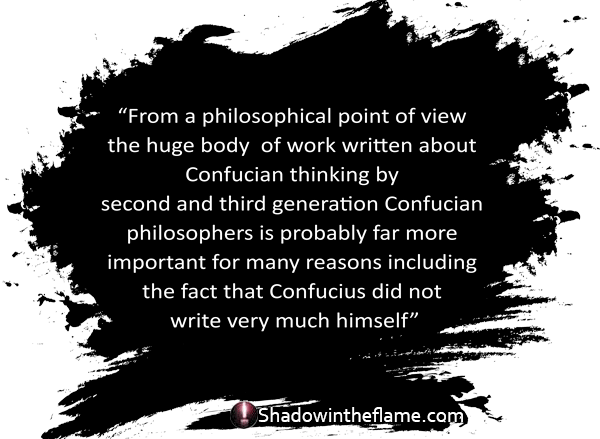
The History of the Philosophy of Moral Action in Ancient China
People often say that the great Eastern Texts; by which they generally mean, the Analects of Confucius, The Tao Te Ching and Buddhist texts, are not really philosophy but something else, such as religion or mysticism.
However, while the Analects and the Tao Te Ching are the two most translated Ancient Chinese texts, they are probably not the most philosophically rigorous works in these genres. To really appreciate the philosophical discussion that has gone on in China over the last 2,500 years, it is necessary to read some disciples of these great Chinese thinkers as well.
Lack of Quality Translations a Problem for Western Readers
And therein lies the problem. I believe that our lack of appreciation of Ancient Chinese philosophy is due to Western ignorance of most of the works that have been written, rather than to any failing in the philosophical works themselves.
And that ignorance is mainly because of the scarcity of translations of the texts until quite recently (the last 200 years). However, there is still a long way to go and there are still many more great texts to be translated in the future. Unfortunately, until then, they are not available to those of us who cannot read Ancient or modern Chinese today.
But one translation does not open a door to greater understanding. In my library, I have multiple translations of almost every ancient philosopher’s works and of the works written in another language other than English, and each one is slightly different and sometimes very different. No translator ever gets the total essence of a book right all the time, so it is necessary to read a variety of translations of the same book to get a better understanding of it.
The lack of excellent translations of the more important works of later Confucian philosophers such as Mencius, Xun Zi, and the Taoist Chuang Tzu and others has been a giant hurdle for Western philosophers that has hindered their understanding of the value of these works.
Translating Ancient Chinese to modern Chinese is hard enough, but translating it into English or French or German is a 100 times more difficult and most translations get some of the text or the concepts they are translating wrong.
In this article, I want to concentrate on Confucian Thinking, but because that is also a huge topic, I will look at just one of the philosophical issues followers of Confucius have debated over the centuries. In doing so, I hope to establish that the ancient Chinese philosophers were as rigorous as any in Western Philosophy.
The area I want to discuss is
The Debate over Confucian’s view of Moral Action and Human Nature.
Basically:
- What do Confucians think about Moral Action?
- Is moral action possible in Confucian Philosophy?
or put another way
- Is it possible for a person to Act Morally?
Now I doubt that there are many people who have not heard of or read the “Sayings of Confucius” known as the Analects. In fact, The Analects has probably been read by more people than have read the bible. But in real life, Confucius favoured a style of teaching later made famous by the ancient Greek philosophers like Socrates, where he would take his students into the garden and just discuss issues or answer questions. He actually wrote very little down.

Confucius
In fact, Confucius did not write the Analects. It was compiled long after his death from notes made by his students and from texts written by them and others.
From a philosophical point of view the huge body of work written about Confucian thinking by second and third generation Confucian philosophers is probably far more important for many reasons, mainly because they are more philosophically rigorous, Let’s face it, they had more time to digest and think about it and of course they had vigorous debates over it which was a luxury denied to Confucius..
Moral Action Becomes an Issue about 200 BC
Confucian scholars only started thinking seriously about Moral Action around 200 BC (Confucius was born in 552 BC and he died in 479 BC). The thing that prompted this line of inquiry was the terrible times China experienced during the Warring States period, which was a time of extreme brutality. This got the philosophers thinking about questions of Human Nature and the relationship between the mind and our desires. The issues they discussed included such topics as:

Confucius
- What is wrong with human nature?
- How can we teach people about or revise Human Nature?
- What is the relationship of the mind to desire?
- How can we control our desire?
- Is desire the cause of everything evil?
The disciple of Confucius most favoured by the Chinese was a chap called Mencius and in later dynasties most people just studied him because his commentary on the Analects and on Confucius was so rigorous, they regarded him as the prophet disciple that clarified everything.
In Part 2 we will briefly review Mencius on human nature and then look at what some of his critics had to say on the subject.
Part 2: The Confucian Philosophy of Moral Action
————————————————————
This is part one of a three-part article by Ric Vatner who has been a keen student of Ancient Chinese Philosophy for over 20 years.
Ric’s father, who was Russian, grew up in China before World War ll and imparted his knowledge of the culture and philosophy of the Chinese people to Ric through the stories he told him as a child. In later life, Ric and his father often discussed or, more correctly, debated, philosophical issues, with Ric advocating the Western views he learned at school or church and his father balancing that by outlining the Chinese philosophy perspective.
Ric says “I found debating my father quite frustrating as he had a good understanding of both the Christian and Jewish religions and Eastern Philosophy and he was a great Chess and Bridge player so just as I thought I was about to score the winning point he would trump me with another approach. I really enjoyed those discussions, and I slowly learned not to be so narrow-minded, when thinking about issues.”
All the Episodes of this series on Moral Action
Confucius on Moral Action and Human Nature – Part 1

